7-Eleven's Ethical Crisis: Breaches of Law, Regulation, and Ethics
VerifiedAdded on 2023/06/03
|5
|1067
|69
Case Study
AI Summary
This case study delves into the ethical dilemma faced by 7-Eleven, specifically focusing on breaches of regulations and laws. The analysis highlights wage fraud, the hiring of individuals without proper visas, and the withholding of employee pay for extended periods. The company's practice of coercing employees with threats of deportation is also examined as a significant ethical and legal violation. The study underscores the importance of ethical employee relations and the potential repercussions of prioritizing profit over fair labor practices. It concludes by advocating for the prosecution of 7-Eleven and the revision of laws protecting foreign workers to prevent future exploitation. Desklib provides solved assignments and resources for students.
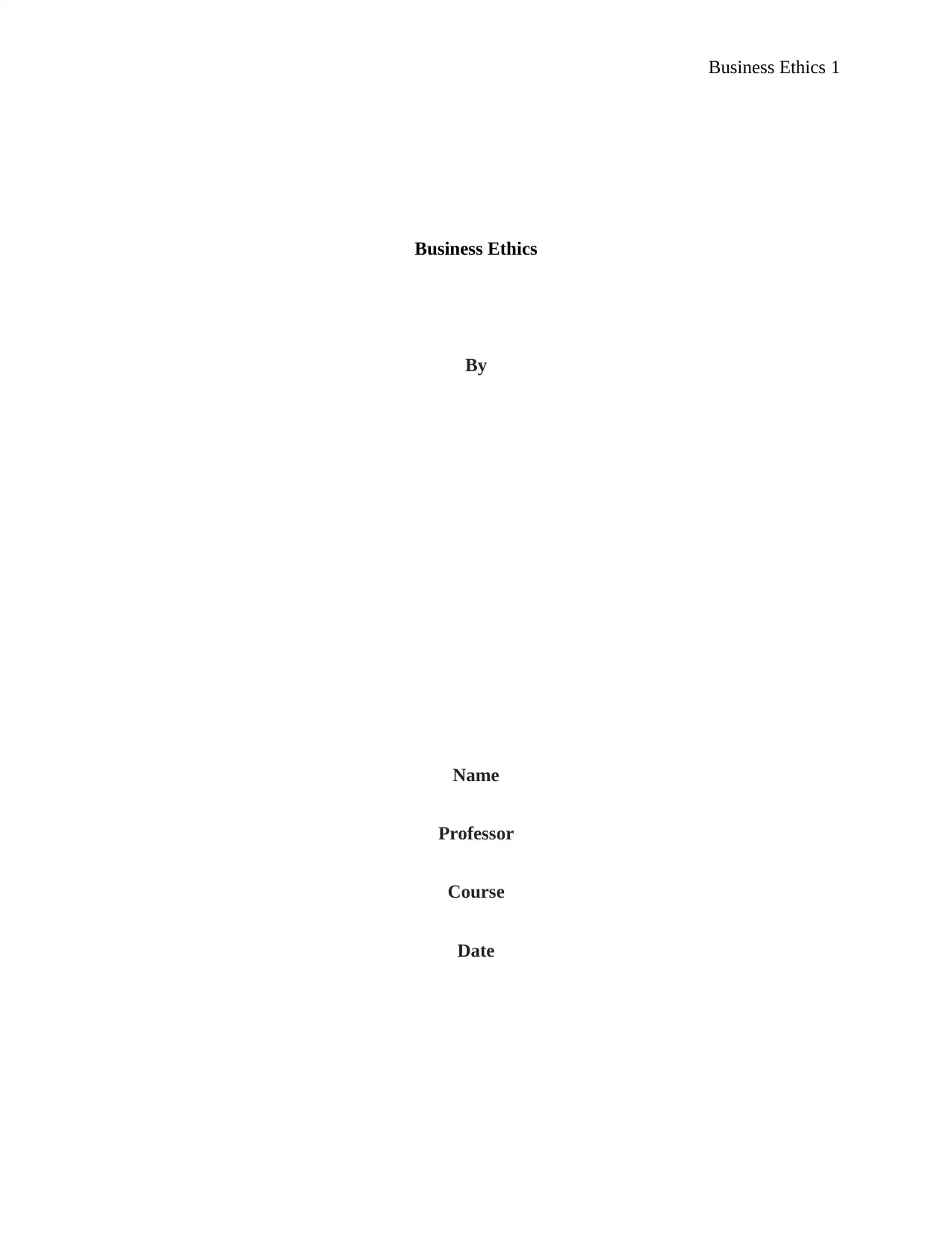
Business Ethics 1
Business Ethics
By
Name
Professor
Course
Date
Business Ethics
By
Name
Professor
Course
Date
Paraphrase This Document
Need a fresh take? Get an instant paraphrase of this document with our AI Paraphraser
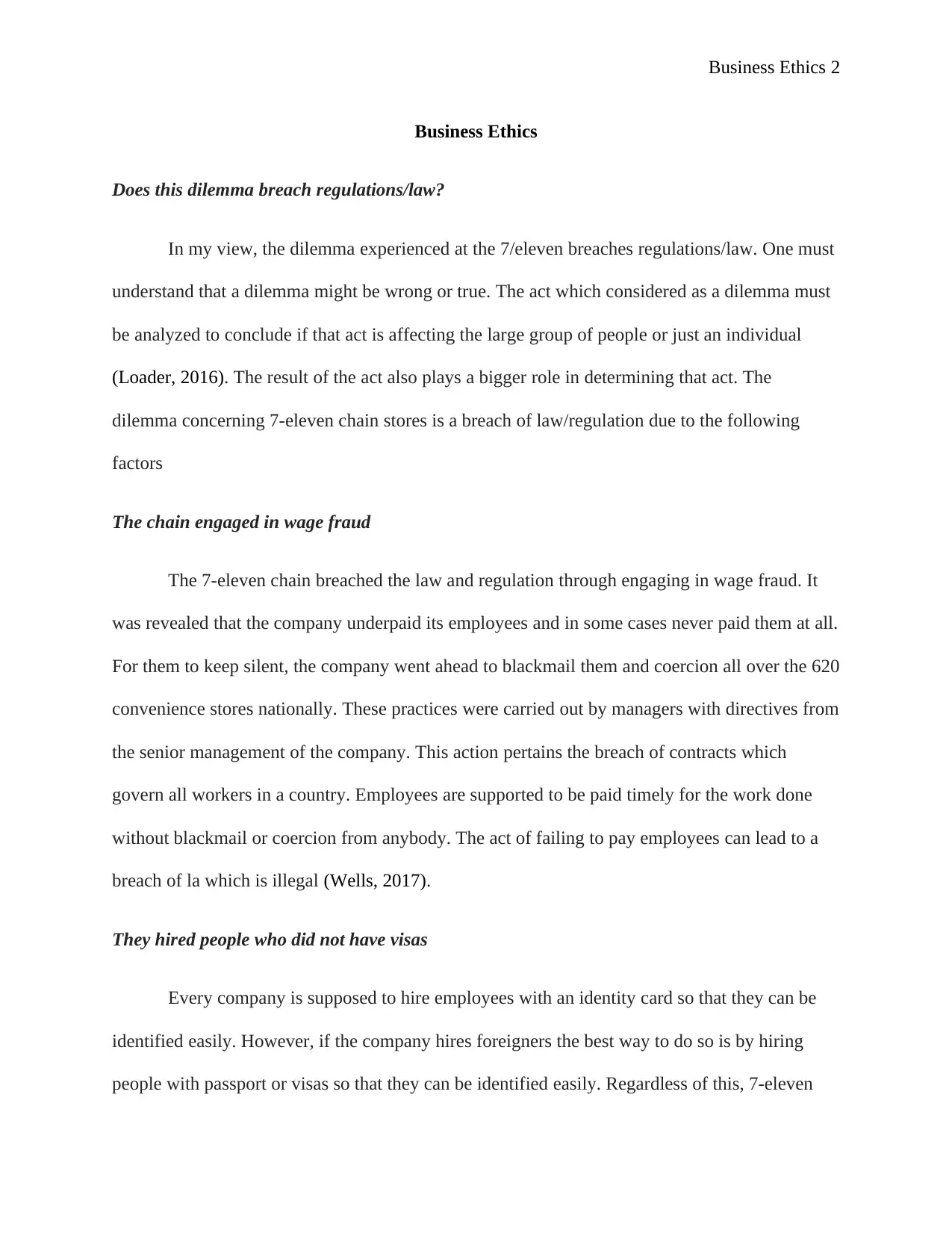
Business Ethics 2
Business Ethics
Does this dilemma breach regulations/law?
In my view, the dilemma experienced at the 7/eleven breaches regulations/law. One must
understand that a dilemma might be wrong or true. The act which considered as a dilemma must
be analyzed to conclude if that act is affecting the large group of people or just an individual
(Loader, 2016). The result of the act also plays a bigger role in determining that act. The
dilemma concerning 7-eleven chain stores is a breach of law/regulation due to the following
factors
The chain engaged in wage fraud
The 7-eleven chain breached the law and regulation through engaging in wage fraud. It
was revealed that the company underpaid its employees and in some cases never paid them at all.
For them to keep silent, the company went ahead to blackmail them and coercion all over the 620
convenience stores nationally. These practices were carried out by managers with directives from
the senior management of the company. This action pertains the breach of contracts which
govern all workers in a country. Employees are supported to be paid timely for the work done
without blackmail or coercion from anybody. The act of failing to pay employees can lead to a
breach of la which is illegal (Wells, 2017).
They hired people who did not have visas
Every company is supposed to hire employees with an identity card so that they can be
identified easily. However, if the company hires foreigners the best way to do so is by hiring
people with passport or visas so that they can be identified easily. Regardless of this, 7-eleven
Business Ethics
Does this dilemma breach regulations/law?
In my view, the dilemma experienced at the 7/eleven breaches regulations/law. One must
understand that a dilemma might be wrong or true. The act which considered as a dilemma must
be analyzed to conclude if that act is affecting the large group of people or just an individual
(Loader, 2016). The result of the act also plays a bigger role in determining that act. The
dilemma concerning 7-eleven chain stores is a breach of law/regulation due to the following
factors
The chain engaged in wage fraud
The 7-eleven chain breached the law and regulation through engaging in wage fraud. It
was revealed that the company underpaid its employees and in some cases never paid them at all.
For them to keep silent, the company went ahead to blackmail them and coercion all over the 620
convenience stores nationally. These practices were carried out by managers with directives from
the senior management of the company. This action pertains the breach of contracts which
govern all workers in a country. Employees are supported to be paid timely for the work done
without blackmail or coercion from anybody. The act of failing to pay employees can lead to a
breach of la which is illegal (Wells, 2017).
They hired people who did not have visas
Every company is supposed to hire employees with an identity card so that they can be
identified easily. However, if the company hires foreigners the best way to do so is by hiring
people with passport or visas so that they can be identified easily. Regardless of this, 7-eleven
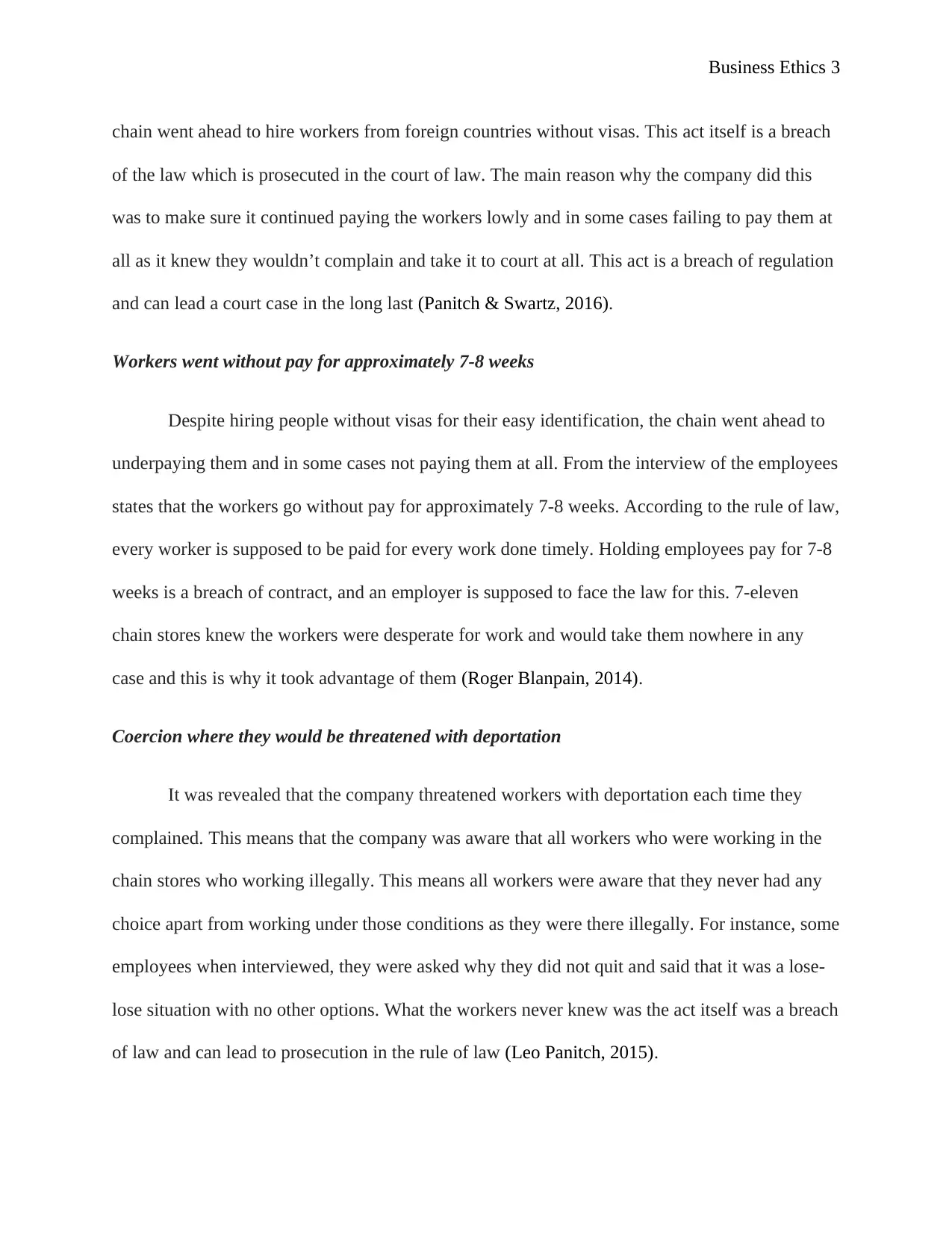
Business Ethics 3
chain went ahead to hire workers from foreign countries without visas. This act itself is a breach
of the law which is prosecuted in the court of law. The main reason why the company did this
was to make sure it continued paying the workers lowly and in some cases failing to pay them at
all as it knew they wouldn’t complain and take it to court at all. This act is a breach of regulation
and can lead a court case in the long last (Panitch & Swartz, 2016).
Workers went without pay for approximately 7-8 weeks
Despite hiring people without visas for their easy identification, the chain went ahead to
underpaying them and in some cases not paying them at all. From the interview of the employees
states that the workers go without pay for approximately 7-8 weeks. According to the rule of law,
every worker is supposed to be paid for every work done timely. Holding employees pay for 7-8
weeks is a breach of contract, and an employer is supposed to face the law for this. 7-eleven
chain stores knew the workers were desperate for work and would take them nowhere in any
case and this is why it took advantage of them (Roger Blanpain, 2014).
Coercion where they would be threatened with deportation
It was revealed that the company threatened workers with deportation each time they
complained. This means that the company was aware that all workers who were working in the
chain stores who working illegally. This means all workers were aware that they never had any
choice apart from working under those conditions as they were there illegally. For instance, some
employees when interviewed, they were asked why they did not quit and said that it was a lose-
lose situation with no other options. What the workers never knew was the act itself was a breach
of law and can lead to prosecution in the rule of law (Leo Panitch, 2015).
chain went ahead to hire workers from foreign countries without visas. This act itself is a breach
of the law which is prosecuted in the court of law. The main reason why the company did this
was to make sure it continued paying the workers lowly and in some cases failing to pay them at
all as it knew they wouldn’t complain and take it to court at all. This act is a breach of regulation
and can lead a court case in the long last (Panitch & Swartz, 2016).
Workers went without pay for approximately 7-8 weeks
Despite hiring people without visas for their easy identification, the chain went ahead to
underpaying them and in some cases not paying them at all. From the interview of the employees
states that the workers go without pay for approximately 7-8 weeks. According to the rule of law,
every worker is supposed to be paid for every work done timely. Holding employees pay for 7-8
weeks is a breach of contract, and an employer is supposed to face the law for this. 7-eleven
chain stores knew the workers were desperate for work and would take them nowhere in any
case and this is why it took advantage of them (Roger Blanpain, 2014).
Coercion where they would be threatened with deportation
It was revealed that the company threatened workers with deportation each time they
complained. This means that the company was aware that all workers who were working in the
chain stores who working illegally. This means all workers were aware that they never had any
choice apart from working under those conditions as they were there illegally. For instance, some
employees when interviewed, they were asked why they did not quit and said that it was a lose-
lose situation with no other options. What the workers never knew was the act itself was a breach
of law and can lead to prosecution in the rule of law (Leo Panitch, 2015).
⊘ This is a preview!⊘
Do you want full access?
Subscribe today to unlock all pages.

Trusted by 1+ million students worldwide
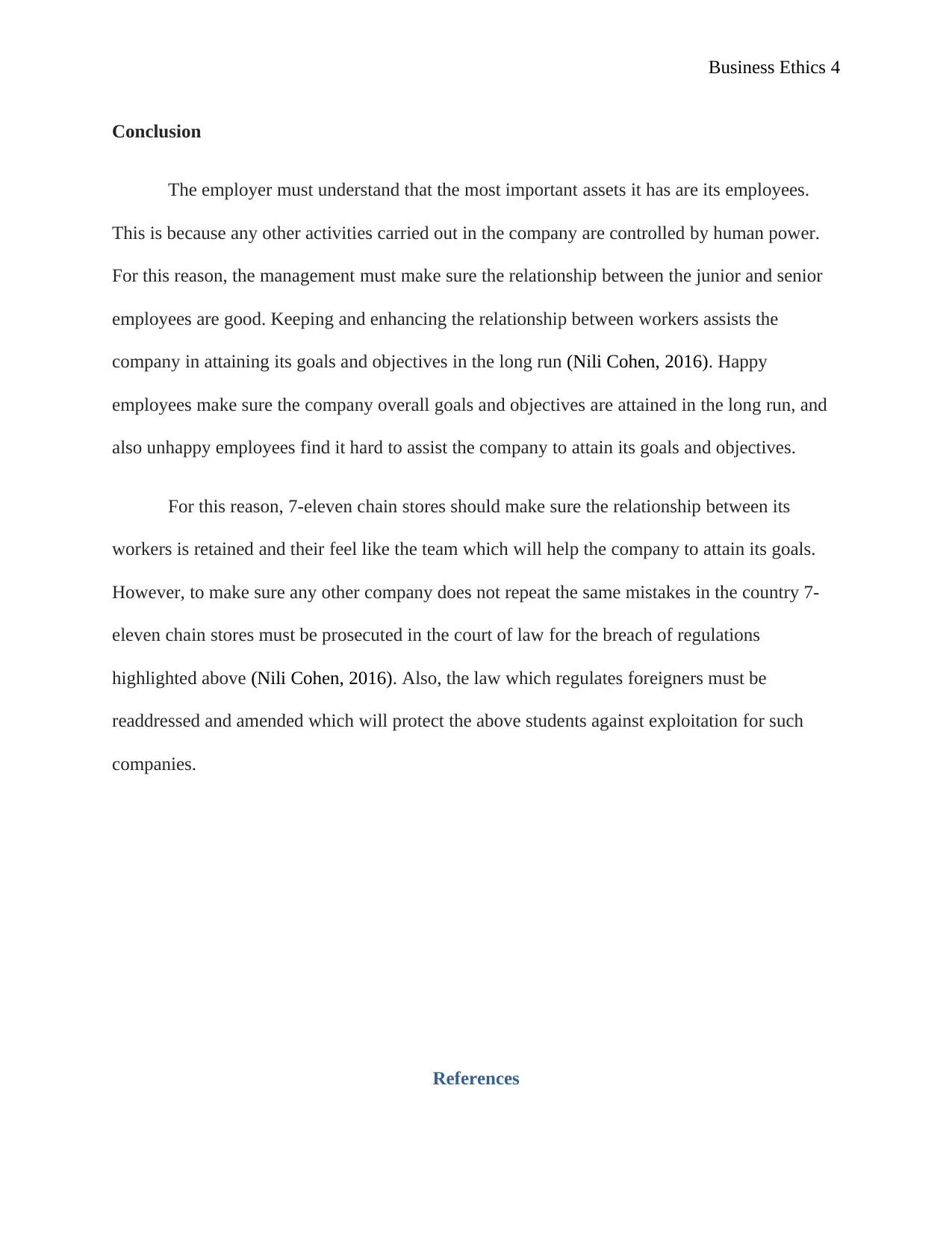
Business Ethics 4
Conclusion
The employer must understand that the most important assets it has are its employees.
This is because any other activities carried out in the company are controlled by human power.
For this reason, the management must make sure the relationship between the junior and senior
employees are good. Keeping and enhancing the relationship between workers assists the
company in attaining its goals and objectives in the long run (Nili Cohen, 2016). Happy
employees make sure the company overall goals and objectives are attained in the long run, and
also unhappy employees find it hard to assist the company to attain its goals and objectives.
For this reason, 7-eleven chain stores should make sure the relationship between its
workers is retained and their feel like the team which will help the company to attain its goals.
However, to make sure any other company does not repeat the same mistakes in the country 7-
eleven chain stores must be prosecuted in the court of law for the breach of regulations
highlighted above (Nili Cohen, 2016). Also, the law which regulates foreigners must be
readdressed and amended which will protect the above students against exploitation for such
companies.
References
Conclusion
The employer must understand that the most important assets it has are its employees.
This is because any other activities carried out in the company are controlled by human power.
For this reason, the management must make sure the relationship between the junior and senior
employees are good. Keeping and enhancing the relationship between workers assists the
company in attaining its goals and objectives in the long run (Nili Cohen, 2016). Happy
employees make sure the company overall goals and objectives are attained in the long run, and
also unhappy employees find it hard to assist the company to attain its goals and objectives.
For this reason, 7-eleven chain stores should make sure the relationship between its
workers is retained and their feel like the team which will help the company to attain its goals.
However, to make sure any other company does not repeat the same mistakes in the country 7-
eleven chain stores must be prosecuted in the court of law for the breach of regulations
highlighted above (Nili Cohen, 2016). Also, the law which regulates foreigners must be
readdressed and amended which will protect the above students against exploitation for such
companies.
References
Paraphrase This Document
Need a fresh take? Get an instant paraphrase of this document with our AI Paraphraser
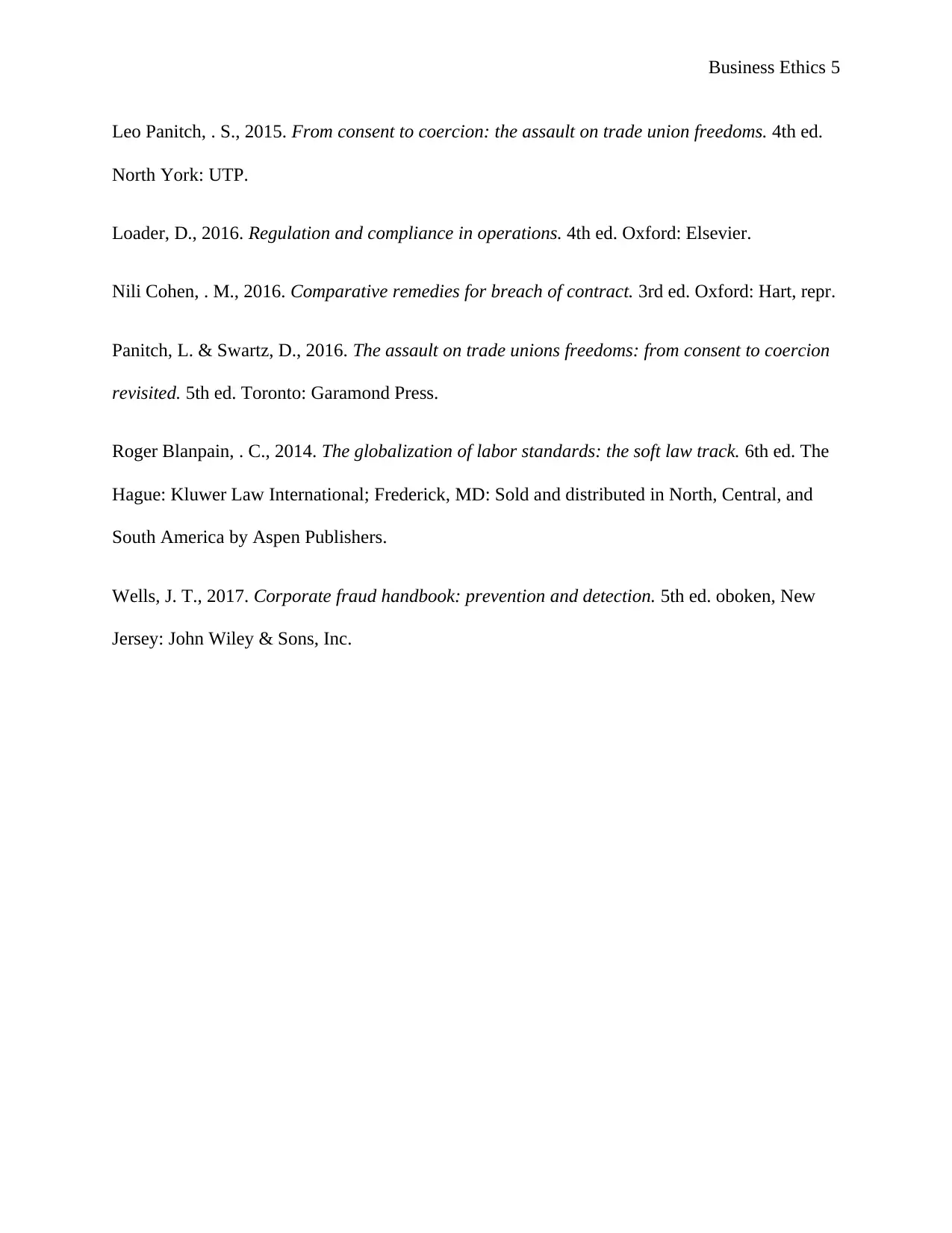
Business Ethics 5
Leo Panitch, . S., 2015. From consent to coercion: the assault on trade union freedoms. 4th ed.
North York: UTP.
Loader, D., 2016. Regulation and compliance in operations. 4th ed. Oxford: Elsevier.
Nili Cohen, . M., 2016. Comparative remedies for breach of contract. 3rd ed. Oxford: Hart, repr.
Panitch, L. & Swartz, D., 2016. The assault on trade unions freedoms: from consent to coercion
revisited. 5th ed. Toronto: Garamond Press.
Roger Blanpain, . C., 2014. The globalization of labor standards: the soft law track. 6th ed. The
Hague: Kluwer Law International; Frederick, MD: Sold and distributed in North, Central, and
South America by Aspen Publishers.
Wells, J. T., 2017. Corporate fraud handbook: prevention and detection. 5th ed. oboken, New
Jersey: John Wiley & Sons, Inc.
Leo Panitch, . S., 2015. From consent to coercion: the assault on trade union freedoms. 4th ed.
North York: UTP.
Loader, D., 2016. Regulation and compliance in operations. 4th ed. Oxford: Elsevier.
Nili Cohen, . M., 2016. Comparative remedies for breach of contract. 3rd ed. Oxford: Hart, repr.
Panitch, L. & Swartz, D., 2016. The assault on trade unions freedoms: from consent to coercion
revisited. 5th ed. Toronto: Garamond Press.
Roger Blanpain, . C., 2014. The globalization of labor standards: the soft law track. 6th ed. The
Hague: Kluwer Law International; Frederick, MD: Sold and distributed in North, Central, and
South America by Aspen Publishers.
Wells, J. T., 2017. Corporate fraud handbook: prevention and detection. 5th ed. oboken, New
Jersey: John Wiley & Sons, Inc.
1 out of 5
Related Documents
Your All-in-One AI-Powered Toolkit for Academic Success.
+13062052269
info@desklib.com
Available 24*7 on WhatsApp / Email
![[object Object]](/_next/static/media/star-bottom.7253800d.svg)
Unlock your academic potential
Copyright © 2020–2026 A2Z Services. All Rights Reserved. Developed and managed by ZUCOL.




